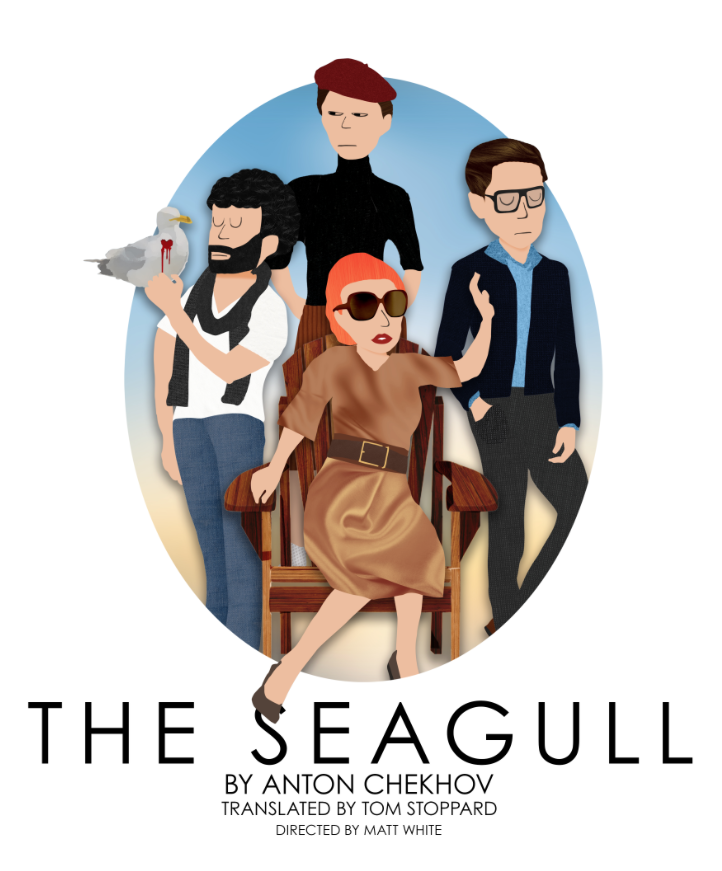
The Seagull Play was originally written by Anton Chekhov, a Russian playwright and short story writer, over 100 years ago.
The play gave me chills, had me laughing, on the edge of my seat in anticipation, and my stomach dropping all within the span of the two-hour production.
It does an excellent job at highlighting how misunderstood mental illness and depression were a century ago, and still continues to be today, but remains humorous.
Chekhov intended the play to be a comedy, but given the large amount of tragic subtext, it’s seen as a tragedy. This is because characters don’t explicitly talk about upsetting events despite heavily implying them.
The play relies on a diverse ensemble cast, where each character plays an integral part of the production.
The characters are extremely passionate about life, about their goals, and about each other.
The Seagull is packed with many different emotions and each actor and actress such an incredible job at capturing this, particularly, in the last few scenes.
Lucas Froese, who plays the doctor, and Taylor Howard, playing Konstantin were very expressive.
Each and every actor and actress had their moment to shine and were able to get across how they were feeling and connect with the audience.
The other character that stood out to me, not for being overly emotional, but for bringing a huge comedic element to every scene he was in, was Trevor Sinke who played Sorin.
Sorin is an old man who longs to move away from the country, even at age 65 and live. The physical comedy by this actor was phenomenal, and his comedic timing was on point.
The use of space is also well executed. The actors often travel into the aisles between the rows of seats, and it brings the audience in more as well as give a sense of uncertainty about where the characters are going to emerge from next.
The set was beautiful. There were string lights on the ceiling, and the backdrop of trees was stunning.
Another thing that I really enjoyed were the scene changes. Music would start and the characters would dance as they were moving the set, including Sorin, the old man, and did so completely in character —which was funny to watch. Masha, played by Samantha Mirandola, mentions a few times how unhappy she is. Her character is in love with Konstantin, played by Taylor Howard, and he shows no interest in her. Masha’s flippant comments and expression of her feelings, which are always immediately followed by laughing it off, bring an additional comedic element to the production. Her inability to express her emotional state in a serious way—without instantly laughing it off – highlights how unprepared people are to deal with mental health.
Nina, played by Kendalin Bishop, is very focused on becoming a famous actress. In the original production, the main character, Nina, was seen as a victim, however, on Thursday night I left the play with a completely different impression of her. I viewed Nina as powerful and having had stood up for herself time and time again.
Nina actively seeks fame throughout the play and is obsessed with Trigorin, played by Eric Fielder.
Trigorin is a famous author who is dating Konstantin’s mother, Arkadina, played by Brooke Reid.
He has a monologue while talking with Nina and his ability to show how overwhelmed he is with life and with being famous is exquisitely captured.
Konstantin is an aspiring writer, and he tries to help Nina achieve fame by having her star in his play. Many of the characters are unsupportive of Konstantin’s aspirations, most of all his mother, who shows up to his play but complains the entire time—to the point that Konstantin stopped the play mid-production.
Konstantin is infatuated to Nina, and mentions that he is going to hurt himself, and nothing is done to help him. A main plot point is when he attempts suicide.
None of the characters address this, which further shows how uncomfortable mental health is to deal with for people. The only time it is mentioned is when his mother is changing the bandages on his forehead.
Matt White, the director, did a wonderful job taking this century old play and adding modern elements.
The play is not only modernized, with mention of Uber, vaping, and modern-day writers. There was also a scene where Konstantin was angry with his mother and calls her a “boomer,” which made the entire theatre laugh.
The Seagull also incorporates many quintessentially Canadian elements like Beavertails, Brockville, Toronto, and the Stratford Festival. At one point, Nina comes back to the country, after moving to Toronto to gain fame, and announces to Konstantin that she is going to be an actress and has a contract in London — which she will be taking a Greyhound bus to.
This subtle play on the city of London is another comedic line which helps balance the depressing undertone in an especially emotional conversation.
Another component that I found particularly interesting is the use of modern songs. Konstantin leaves the house in one scene and Welcome to the Black Parade by My Chemical Romance starts playing. This song is identified as an “emo” song, and it is an interesting way to portray emotion through a different medium.
The play does a great job at addressing hard-to-deal-with subjects in a unique way. The balance between comedy and tragedy was achieved to such a great degree.
It was well polished, with a beautiful set, and a group of very talented actors and actresses.
I highly enjoyed myself and would see it again if given the chance.
Find some more information and interactive media at: www.uwseagull.com






























